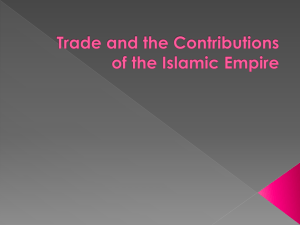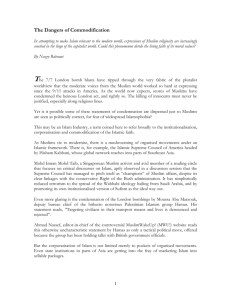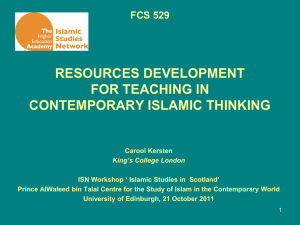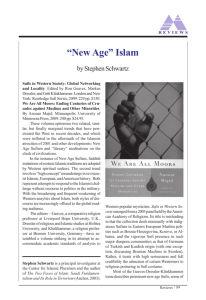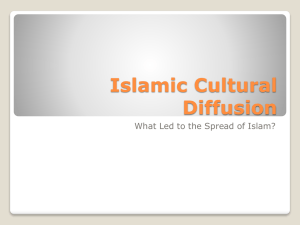Transcript of Remarks
advertisement
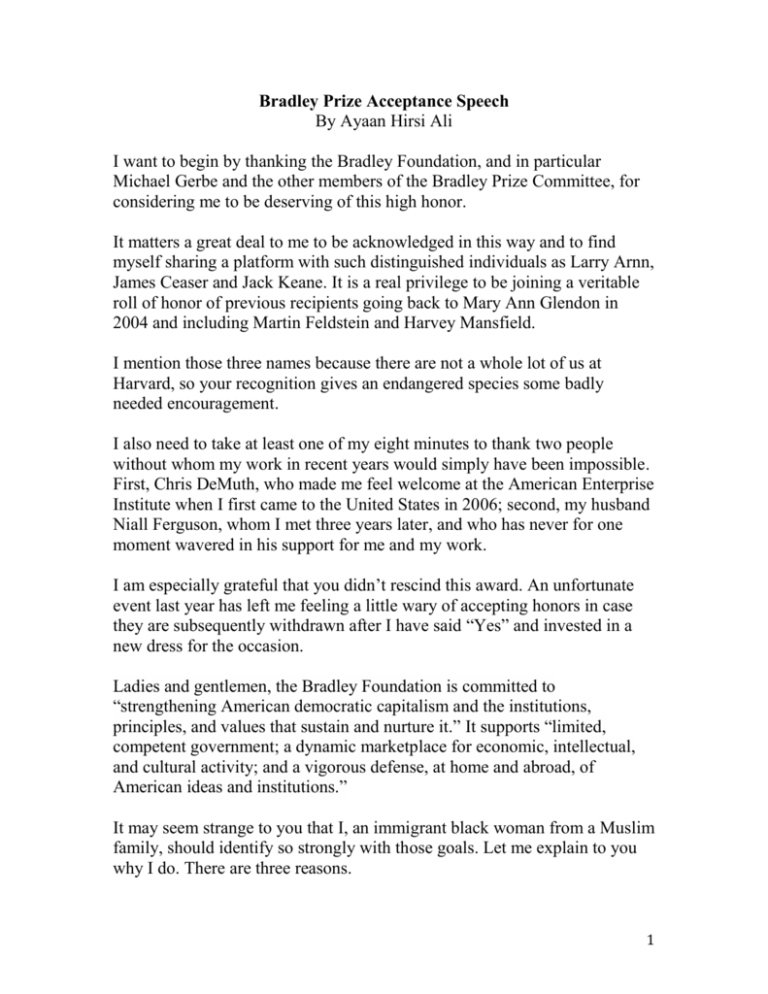
Bradley Prize Acceptance Speech By Ayaan Hirsi Ali I want to begin by thanking the Bradley Foundation, and in particular Michael Gerbe and the other members of the Bradley Prize Committee, for considering me to be deserving of this high honor. It matters a great deal to me to be acknowledged in this way and to find myself sharing a platform with such distinguished individuals as Larry Arnn, James Ceaser and Jack Keane. It is a real privilege to be joining a veritable roll of honor of previous recipients going back to Mary Ann Glendon in 2004 and including Martin Feldstein and Harvey Mansfield. I mention those three names because there are not a whole lot of us at Harvard, so your recognition gives an endangered species some badly needed encouragement. I also need to take at least one of my eight minutes to thank two people without whom my work in recent years would simply have been impossible. First, Chris DeMuth, who made me feel welcome at the American Enterprise Institute when I first came to the United States in 2006; second, my husband Niall Ferguson, whom I met three years later, and who has never for one moment wavered in his support for me and my work. I am especially grateful that you didn’t rescind this award. An unfortunate event last year has left me feeling a little wary of accepting honors in case they are subsequently withdrawn after I have said “Yes” and invested in a new dress for the occasion. Ladies and gentlemen, the Bradley Foundation is committed to “strengthening American democratic capitalism and the institutions, principles, and values that sustain and nurture it.” It supports “limited, competent government; a dynamic marketplace for economic, intellectual, and cultural activity; and a vigorous defense, at home and abroad, of American ideas and institutions.” It may seem strange to you that I, an immigrant black woman from a Muslim family, should identify so strongly with those goals. Let me explain to you why I do. There are three reasons. 1 First, it is because my life’s journey – which has taken me from Somalia to Saudi Arabia to Kenya to the Netherlands and finally here – could not have been better designed to make me appreciate American institutions. The majority of people here tonight have never known what it is to live without political and economic freedom. So try imagining undemocratic communism, of the sort that was brutally inflicted on Somalia by Mohamed Siad Barre. Imagine unlimited, incompetent government of the sort his dictatorship exemplified. That was the regime I was born under. Imagine the very opposite of a “marketplace for economic, intellectual, and cultural activity”: imagine instead a totalitarian regime based on seventhcentury doctrines and laws. That is what I experienced living as a young girl in Mecca. And imagine the very opposite of “a vigorous defense, at home and abroad, of American ideas and institutions.” Imagine a feeble abandonment, at home and abroad, of the core principles of Western freedom. I am sorry to say that it is what I all too often witnessed in the years I spent as a European parliamentarian. Second, I think I can justly say that I was among the first in my age group of millions of Muslims – to admit that our faith has begotten a bloodthirsty ideology that was determined to destroy the principles of liberty and humanity. Even after 9/11, there are still those who naively believe that it is a threat only in countries like Syria, Iraq and Afghanistan. The reality is that the threat is global. A recent report by the UN Security Council confirmed that more than 100 countries are now supplying recruits to the likes of Islamic State and Al Qaeda. And the United States is one of them. This year alone, the number of U.S.-based individuals involved in international terror-related cases has risen to 40. Yet what concerns me is not just Jihad. It is also the non-violent activities, from preaching to fundraising, that are its essential seedbed. Often, those who engage in these activities are very skillful at representing themselves as moderates. 2 Let me quote you the words of Abdurahman Alamoudi, a founder of the American Muslim Council, who at one time was an Islamic adviser to President Clinton and a “goodwill ambassador” for the State Department, as well as being consulted by some eminent Republicans. “We have a chance,” he declared to a Muslim audience, “to be the moral leadership of America. … It will happen, it will happen praise [Allah] the Exalted. I have no doubt in my mind, it depends on me and you, either we do it now or we do it after a hundred years, but this country will become a Muslim country.” That is the authentic voice of the plot against America today. I am glad to report that Mr. Alamoudi is currently serving a 23-year prison sentence for financial and conspiracy offenses involving the Libyan government and the Al Qaeda plot to assassinate the then Crown Prince of Saudi Arabia. Thirdly and finally, I have come to see that there is a related threat posed to American institutions – the one posed by those within the West who would appease the Islamic extremists. Last September, President Obama insisted that the Islamic State “is not Islamic.” Later that month, he told the UN General Assembly that “Islam teaches peace.” Phrases like “radical Islam” and “Islamic extremism” are no longer heard in White House press briefings. The approved term is “violent extremism.” The decision not to call violence committed in the name of Islam by its true name is a strange one. Imagine if Western leaders during the Cold War had gone around calling Communism an ideology of peace, or condemning the Baader Meinhof gang for not being true Marxists. Ladies and gentlemen, I believe it is time to drop the euphemisms and verbal contortions. As I argue in my most recent book, Heretic, a battle for the future of Islam is taking place between reformers and reactionaries, dissidents and jihadists, with the majority of Muslims caught in the middle, unsure which side to take. The outcome matters to us all. And the United States needs to start helping the right side win. 3 Sometimes people who want to smear me use the sham term “Islamophobe,” which is designed to imply that those who speak critically of Islamic extremism are mere bigots. Well, it is true that I have a phobia. But it is not directed against Muslims. After all, I used to be one. My phobia is towards any ideology – whether it is communism, fascism or Islamism – that threatens individual freedom and the institutions that protect freedom. That is why I am so proud to accept this honor from you tonight. Thank you so very much. 4




